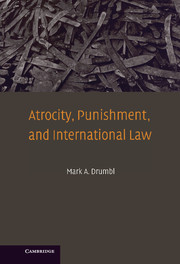Book contents
- Frontmatter
- Contents
- Preface and Acknowledgments
- List of Abbreviations
- Atrocity, Punishment, and International Law
- 1 Extraordinary Crime and Ordinary Punishment: An Overview
- 2 Conformity and Deviance
- 3 Punishment of International Crimes in International Criminal Tribunals
- 4 Punishment of International Crimes in National and Local Criminal Justice Institutions
- 5 Legal Mimicry
- 6 Quest for Purpose
- 7 From Law to Justice
- 8 Conclusion: Some Immediate Implications
- Notes
- Index
8 - Conclusion: Some Immediate Implications
Published online by Cambridge University Press: 03 December 2009
- Frontmatter
- Contents
- Preface and Acknowledgments
- List of Abbreviations
- Atrocity, Punishment, and International Law
- 1 Extraordinary Crime and Ordinary Punishment: An Overview
- 2 Conformity and Deviance
- 3 Punishment of International Crimes in International Criminal Tribunals
- 4 Punishment of International Crimes in National and Local Criminal Justice Institutions
- 5 Legal Mimicry
- 6 Quest for Purpose
- 7 From Law to Justice
- 8 Conclusion: Some Immediate Implications
- Notes
- Index
Summary
The trajectory I have traced began with the compilation and review of sentences issued by domestic courts and international tribunals in cases of great evil. Courts and tribunals affirm that they punish extraordinary international criminals mainly to promote retribution, deterrence, and expressivism. It turns out, however, that there is a shortfall between retributive and deterrent goals and the realities of sentence. This shortfall can be explained in part by international criminal law's reliance on the modalities of ordinary liberal criminal law, which is designed for deviant individuals in select jurisdictions and not for the obedient masses that, to varying degrees, are associated with discrimination-based atrocity. Expressive aspirations, although more obtainable, remain quite frail.
In response to this shortfall and frailty, I propose a process of critique and renewal that portends changes in the way in which perpetrators of atrocity are to be punished. These reforms would encourage looking beyond stated punitive rationales to consider other justifications, including currently undervalued goals such as restoration. Societies with a collective as opposed to individualist ethos would have more space to pursue accountability mechanisms other than adversarial criminal trials. Vertical and horizontal reforms would splinter the present focus on a handful of retrospective trials motored top-down by internationalist modalities; these reforms also would fragment the powerful remedial preference for incarceration. For a variety of reasons exogenous to the quality of justice, liberal internationalist modalities, with their preference for trial and incarceration, have migrated to the national and local levels even in those places where such process and sanction are neither innate nor indigenous.
- Type
- Chapter
- Information
- Atrocity, Punishment, and International Law , pp. 206 - 210Publisher: Cambridge University PressPrint publication year: 2007



